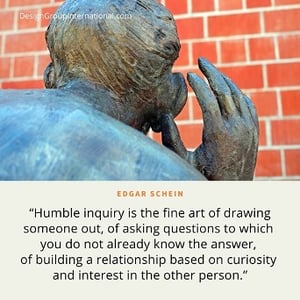As the ramifications of COVID-19 have rippled through our economy, the questions posed to leaders have taken on a heightened sense of urgency:
- My child is living on campus in the dorm. What happens if she tests positive for COVID-19?
- We’ve been working remotely for six months. When can we all return to the office?
- My board members are in the weeds now more than ever. How can I help them get back to focusing on bigger issues?
Sometimes questions don’t have easy answers. Sometimes when we listen more deeply, we might find that the person is really seeking the answer to a different question altogether.
Recently a head of school confided, “No matter how I answer a parent’s question, there is always another question, then another, and another.” I responded, “Interesting. . . what if they’re not asking the question that they really want to ask?” After a moment of silence, he sighed and said, “Yeah. What they really want to know is whether or not their child will be safe at school. And you know what? I don’t have the answer to that question.”

From an early age, we are trained to answer questions. What’s the capital of Nebraska? How do you calculate the area of a circle? We’re also trained to answer questions quickly. Remember back to your school days, when raising your hand first was a sign that you knew the material and were ready to participate? That eagerness was rewarded—kind of like the first contestant to hit the buzzer on Jeopardy.
Unfortunately, most of us aren’t trained to be good listeners. An article I read recently cited four reasons why people don’t listen well:
- They would rather be talking.
- They’re distracted during the conversation.
- They’re not interested in the content of the conversation.
- They’re just too busy to listen.
Yikes. It’s true, and sometimes I’m as guilty of these four things as the next person.
When you get the sense that there is some ambiguity behind someone’s question, do your best to answer, but also respond with a question that goes deeper into what the person might be searching for, such as, “Can you tell me more about what you hope the board can accomplish if they get out of the weeds?” or “Can you say more about your concerns for your daughter’s safety on campus?”When people pose a question, they’re searching for clarity. They may want to understand something, to learn your perspective, or to simply get information. But sometimes, they don’t really know what they’re looking for; all they know is that asking a question may help.
Each of these follow-up questions are good examples of humble inquiry: the gentle art of asking a question to help bring clarity to a situation. When we become clear on the primary challenge in front of us, it’s easier to provide help—or to know how to ask for it. When we truly understand what the other person is seeking, we can empathize where they are coming from and why, and we can begin to answer the questions they’re really asking.
If you would like to schedule a high-value 30-minute discovery call about this approach to listening, I’d be honored to walk alongside you. As always, please feel free to call me at 616.516.9870 or e-mail me at lons@designgroupintl.com.
Tags:
Process Consultation, nonprofit leadership, lifelong learning, organizational purpose, Non-Profit Leadership, capital campaigns, stewardship services, Fundraising, fund raising, leadership and communication, Change Management, leadership communication, fundraising philosophy, lon swartzentruber, advancement, nonprofits, coaching, crisis communication, crisis, Coronavirus, COVID-19, listening, humble inquiry, Edgar Schein, helping, A Cause Greater Blog/Lon%20L.%20Swartzentruber%20Headshot%20(300x300).png)
September 17, 2020

Comments